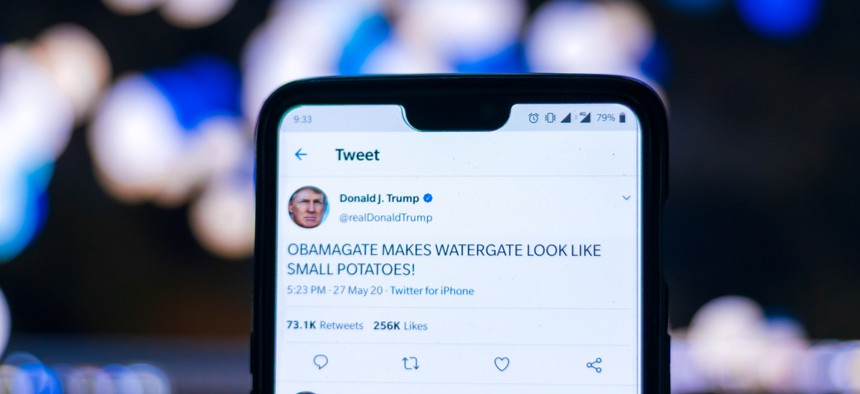Trump’s Social-Media Order Is a Gift to Disinformation Bots, Experts Say

Siraj Ahmad/Shutterstock.com
But much of the order may be legally unenforceable.
A new presidential order targeting social media companies for perceived bias would hurt their ability to block bots and defuse disinformation, experts and lawmakers say.
The order seeks to limit legal protections for companies that run online platforms, according to a draft revealed on Thursday. The order argues that a social-media company that labels factually inaccurate tweets as such, for example, forfeits its immunity from libel suits — a protection granted by section 230(c) of the Communications Decency Act, or CDA — because it is acting as a traditional editor and publisher, not a neutral platform.
The order goes on to instruct the Federal Communications Commission, or FCC, to propose regulations to govern how social media companies can punish rule breakers, such as by suspending accounts or purging content. It instructs the FCC to make sure that such actions are taken “within good faith” of the CDA.
That could mean social media companies would have to try to notify users before taking action. The order also gives the National Telecommunications and Information Administration, or NTIA, broad authority to propose further rules and regulations for social media companies “that the NTIA concludes may be appropriate to advance the policy described...”
The order follows complaints from right-wing groups who have said that they are unfairly targeted for suspension and content removal by the platforms’ moderators.
Tech policy experts who spoke to Defense One said that the order would limit the ability of social media networks to block efforts to use their platforms for manipulation and disinformation, since the companies would need to give each disinformation-spreading bot a sort of hearing before it purges them.
Daphne Keller, a fellow at Stanford’s Center for Internet and Society, said, “If the [executive order] had legal effect, it would certainly make it much, much harder to police disinformation online.” But she said much of the order is of dubious legality, and has produced a color-coded version showing how and why.
Alex Howard, Director of the Digital Democracy Project at the left-leaning Demand Progress, said that the order “further abuses the powers of the presidency to advance a conspiracy about ideologically motivated censorship on social media without evidence, intimidating private companies from taking even small steps to accurately inform the public about elections, health and other issues by labeling provably false content, much less removing it from the platform if [those companies] decide it violates their policy.”
“This executive order and accompanying messaging appear designed to intimidate the tech companies from taking more aggressive steps to combat disinformation, particularly Twitter,” Howard said.
Sen. Mark Warner, D-Va., who sits on the Senate Intelligence Committee and has made disinformation and online platforms a legislative focus, said that the order is an “effort to cow platforms into allowing Trump, dark money groups, and right-wing militias to continue to exploit their tools to sow disinformation, engage in targeted harassment, and suppress voter participation.” He described the order as a “distraction from the legitimate efforts to establish common sense regulations for dominant social media platforms.”
It’s not the first time Trump has tried to regulate social media companies. Last August, the administration drafted a similar executive order that would allow the FTC and FCC to police social media companies for perceived bias. But officials at the FTC and FCC pushed back against the order on constitutional grounds.
Trump issued the new order after Twitter on Tuesday labeled a provably false tweet about mail-in ballots with a “fact check” link. That action could open them up to special scrutiny for editorializing, but exactly who is empowered to perform that scrutiny is legally unclear. Twitter doesn’t take political campaign money and can’t really be considered a monopoly by any reasonable standard, so it’s hard to see how relevant regulations that govern politically-paid speech and monopolies might apply to them.
Howard said that a larger worry would be Trump using emergency powers to compel the Justice Department to act against the social media companies. “The Justice Department has, by far, the most power that can be abused in this context, from filing suits to investigating them, to trying to convene states attorneys general, etc.,” he said.
That concern was shared by Julian Sanchez, a senior fellow at the libertarian-leaning Cato Institute and contributing editor for Reason magazine. Sanchez noted that Trump had invoked “national security” as pretexts for various other policies, and wondered whether he would try to do so in this area.
Disturbing thought of the day: Trump pursued his trade & immigration policies via brazenly pretextual invocation of “national security” authorities. If he tried using similar Communications Act powers to shut down (or extort) social media platforms, would Congress do anything?
— Julian Sanchez (@normative) May 27, 2020
Keller said the order “reads like a stream-of-consciousness tweetstorm that some poor staffer had to turn into the form of an Executive Order. The underlying issues it raises are really important, of course: We need an informed public debate about the power of platforms over public discourse. But that’s not what the EO is. It isn’t reasoned discussion, and for the most part, it isn’t even lawmaking.”
NEXT STORY: Quick Hits






